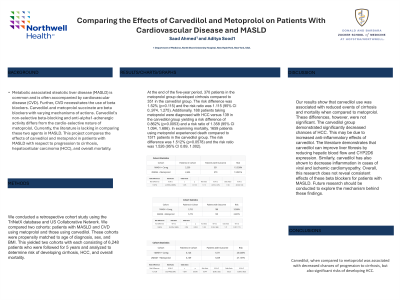Sunday Poster Session
Category: Liver
P1244 - Comparing the Effects of Carvedilol and Metoprolol on Patients With Cardiovascular Disease and MASLD
Sunday, October 27, 2024
3:30 PM - 7:00 PM ET
Location: Exhibit Hall E

Has Audio
- SA
Saad Ahmed, MD
Northwell Health-NSLIJ
Manhasset, NY
Presenting Author(s)
Saad Ahmed, MD, Aditya Sood, MD
Northwell Health-NSLIJ, Manhasset, NY
Introduction: Metabolic associated steatotic liver disease (MASLD) is common and is often accompanied by cardiovascular disease (CVD). Further, CVD necessitates the use of beta blockers. Carvedilol and metoprolol succinate are beta blockers with varying mechanisms of actions. Carvedilol's non-selective beta-blocking and anti-alpha1-adrenergic activity differs from the cardio-selective nature of metoprolol. Currently, the literature is lacking in comparing these two agents in MASLD. This project compares the effects of carvedilol and metoprolol in patients with MASLD with respect to progression to cirrhosis, hepatocellular carcinoma (HCC), and overall mortality.
Methods: We conducted a retrospective cohort study using the TriNetX database and US Collaborative Network. We compared two cohorts: patients with MASLD and CVD using metoprolol and those using carvedilol. These cohorts were propensity matched to age of diagnosis, sex, and BMI. This yielded two cohorts with each consisting of 6,248 patients who were followed for 5 years and analyzed to determine risk of developing cirrhosis, HCC, and overall mortality.
Results: At the end of the five-year period, 370 patients in the metoprolol group developed cirrhosis compared to 351 in the carvedilol group. The risk difference was 1.52% (p=0.115) and the risk ratio was 1.115 (95% CI 0.,974, 1.275). Additionally, 188 patients taking metoprolol were diagnosed with HCC versus 139 in the carvedilol group yielding a risk difference of 0.862% (p=0.0053) and a risk ratio of 1.358 (95% CI 1.094, 1.686). In examining mortality, 1659 patients using metoprolol experienced death compared to 1571 patients in the carvedilol group. The risk difference was 1.512% (p=0.0578) and the risk ratio was 1.526 (95% CI 0.89, 1.002).
Discussion: Our results show that carvedilol use was associated with reduced events of cirrhosis and mortality when compared to metoprolol. These differences, however, were not significant. The carvedilol group demonstrated significantly decreased chances of HCC. This may be due to increased anti-inflammatory effects of carvedilol. The literature demonstrates that carvedilol can improve liver fibrosis by reducing hepatic blood flow and CYP2D6 expression. Similarly, carvedilol has also shown to decrease inflammation in cases of viral and ischemic cardiomyopathy. Overall, this research does not reveal consistent effects of these beta blockers for patients with MASLD. Future research should be conducted to explore the mechanism behind these findings.
Disclosures:
Saad Ahmed, MD, Aditya Sood, MD. P1244 - Comparing the Effects of Carvedilol and Metoprolol on Patients With Cardiovascular Disease and MASLD, ACG 2024 Annual Scientific Meeting Abstracts. Philadelphia, PA: American College of Gastroenterology.
Northwell Health-NSLIJ, Manhasset, NY
Introduction: Metabolic associated steatotic liver disease (MASLD) is common and is often accompanied by cardiovascular disease (CVD). Further, CVD necessitates the use of beta blockers. Carvedilol and metoprolol succinate are beta blockers with varying mechanisms of actions. Carvedilol's non-selective beta-blocking and anti-alpha1-adrenergic activity differs from the cardio-selective nature of metoprolol. Currently, the literature is lacking in comparing these two agents in MASLD. This project compares the effects of carvedilol and metoprolol in patients with MASLD with respect to progression to cirrhosis, hepatocellular carcinoma (HCC), and overall mortality.
Methods: We conducted a retrospective cohort study using the TriNetX database and US Collaborative Network. We compared two cohorts: patients with MASLD and CVD using metoprolol and those using carvedilol. These cohorts were propensity matched to age of diagnosis, sex, and BMI. This yielded two cohorts with each consisting of 6,248 patients who were followed for 5 years and analyzed to determine risk of developing cirrhosis, HCC, and overall mortality.
Results: At the end of the five-year period, 370 patients in the metoprolol group developed cirrhosis compared to 351 in the carvedilol group. The risk difference was 1.52% (p=0.115) and the risk ratio was 1.115 (95% CI 0.,974, 1.275). Additionally, 188 patients taking metoprolol were diagnosed with HCC versus 139 in the carvedilol group yielding a risk difference of 0.862% (p=0.0053) and a risk ratio of 1.358 (95% CI 1.094, 1.686). In examining mortality, 1659 patients using metoprolol experienced death compared to 1571 patients in the carvedilol group. The risk difference was 1.512% (p=0.0578) and the risk ratio was 1.526 (95% CI 0.89, 1.002).
Discussion: Our results show that carvedilol use was associated with reduced events of cirrhosis and mortality when compared to metoprolol. These differences, however, were not significant. The carvedilol group demonstrated significantly decreased chances of HCC. This may be due to increased anti-inflammatory effects of carvedilol. The literature demonstrates that carvedilol can improve liver fibrosis by reducing hepatic blood flow and CYP2D6 expression. Similarly, carvedilol has also shown to decrease inflammation in cases of viral and ischemic cardiomyopathy. Overall, this research does not reveal consistent effects of these beta blockers for patients with MASLD. Future research should be conducted to explore the mechanism behind these findings.
Disclosures:
Saad Ahmed indicated no relevant financial relationships.
Aditya Sood indicated no relevant financial relationships.
Saad Ahmed, MD, Aditya Sood, MD. P1244 - Comparing the Effects of Carvedilol and Metoprolol on Patients With Cardiovascular Disease and MASLD, ACG 2024 Annual Scientific Meeting Abstracts. Philadelphia, PA: American College of Gastroenterology.
